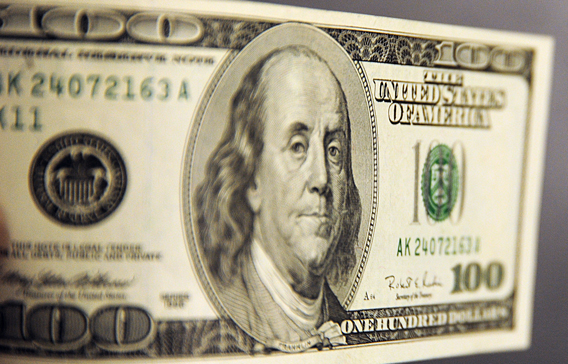The Egyptian pound lost about 23% of its value against the US dollar on the official market during the first two years of Abdel Fattah Al-Sisi’s presidency. This rate increases even more on the informal market, amounting to 44%.
Al-Sisi came to power in June 2014 when the US dollar price was EGP 7.13 to buy and EGP 7.17 to sell. Two years later, the exchange price stands at EGP 8.78 to buy and EGP 8.88 to sell, an increase of EGP 1.65-1.71, according to the official figures of the Central Bank of Egypt (CBE).
On the parallel market, the pound is even less appreciated; the exchange price in June stands at EGP 10.8, from EGP 7.5 in June 2014.
Many analysts believe that the devaluation of the Egyptian pound against the US dollar first began after the 25 January Revolution in 2011, as the price stood at EGP 5.20 before the revolution. The decline, however, continued throughout Al-Sisi’s term amid severe shortages in most of the state’s foreign exchange resources.
With the plummeting decline in foreign exchange reserves, expectations for further devaluation emerged.
Member of the Federation of Egyptian Banks (FEB) and vice president of the Egyptian Arab Land Bank Adnan El-Sharkawy said the government is required to configure the state to attract foreign investment, restore tourism, promote Egyptian expats’ remittances, and stimulate exports to bring foreign exchange flows to Egypt again.
Board member of both the Suez Canal Bank and the Arab Sudanese Bank Mohamed Abdel Aal said the CBE and the government should support the exchange price in order to stabilise the market. This, he added, can be done by not granting licences to new import companies, as well as saving basic goods and production inputs. Moreover, the government should also continue its policy of not financing the import of non-essential goods.
He noted that authorities should take strict control of remittances to keep them within the banking system.
While forecasts by international and local institutions predict another devaluation in the coming period, Abdel Aal believes the CBE must not take that move without a strong reserve to address the negative effects that may result.
The CBE cut the price of the local currency in March by 14%. Since then, domestic and international research institutions have anticipated that the CBE will take further cuts by similar or a slightly higher rate.
According to the head of treasury at a foreign bank operating in Egypt, Tamer Youssef, the value of local currency is a mirror to the real economic situation and the state’s resources of foreign exchange.
He added that the CBE will be forced to depreciate the pound further if the state is set to encourage the return of foreign investments to Egypt.
Youssef explained that the suffering of foreign exchange resources—especially tourism— along with an already low reserves have put stress on the currency and its value.
An assistant general manager of the Financial Sector at a private bank operating in Egypt, Osama El-Menilawy, said the CBE is likely to make another depreciation of the Egyptian pound if economic conditions do not improve or if there is no cash flow that could bridge the gap between demand on the US dollar and its supply.







